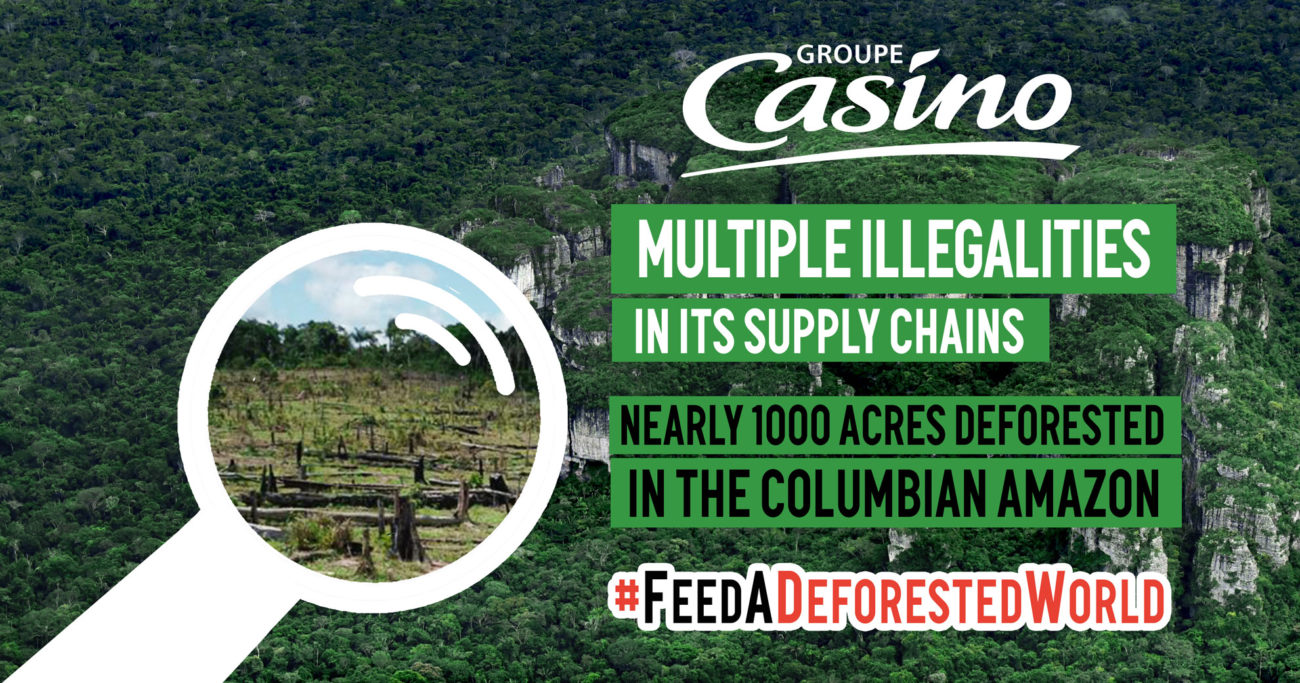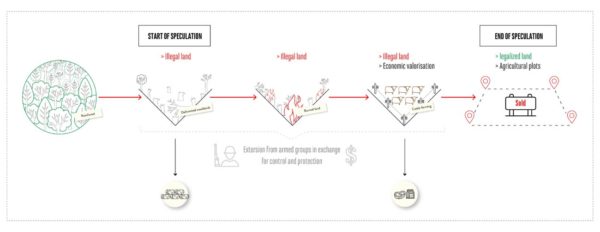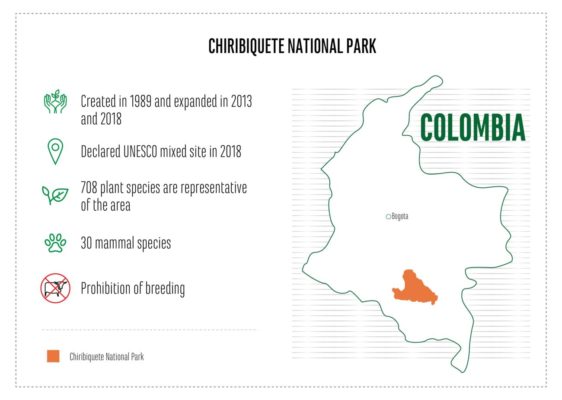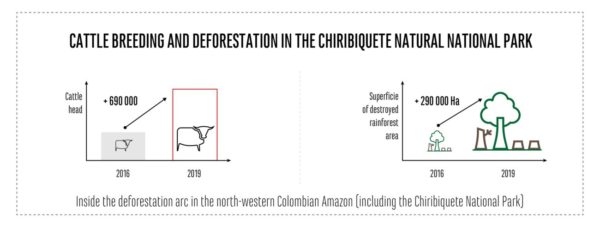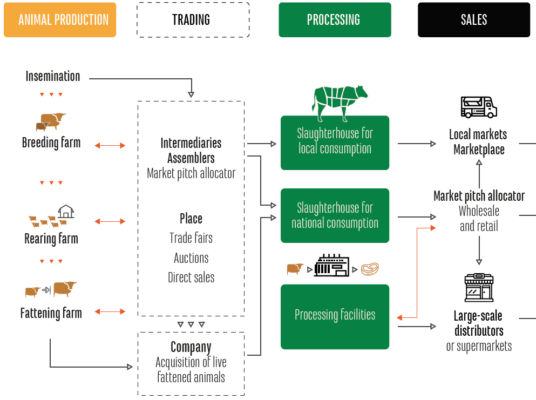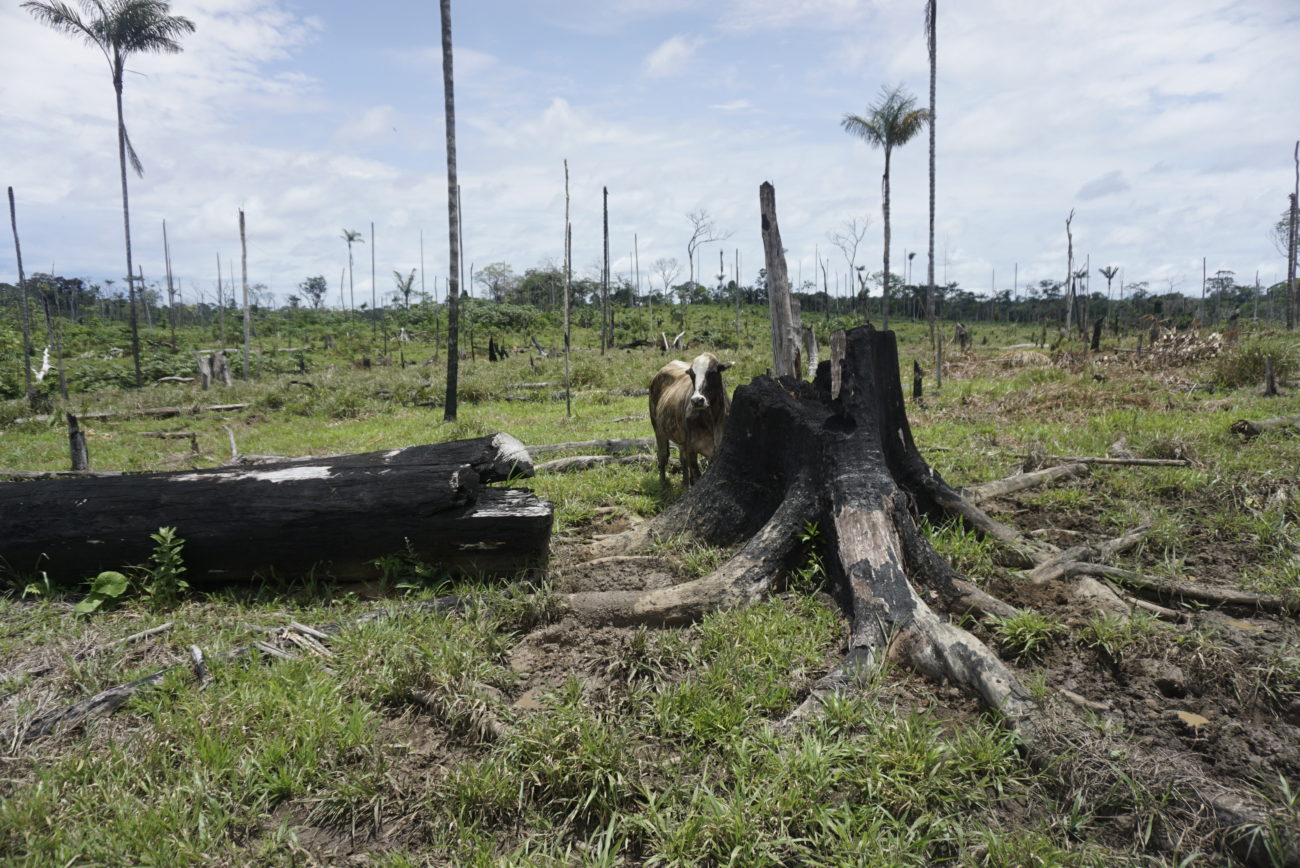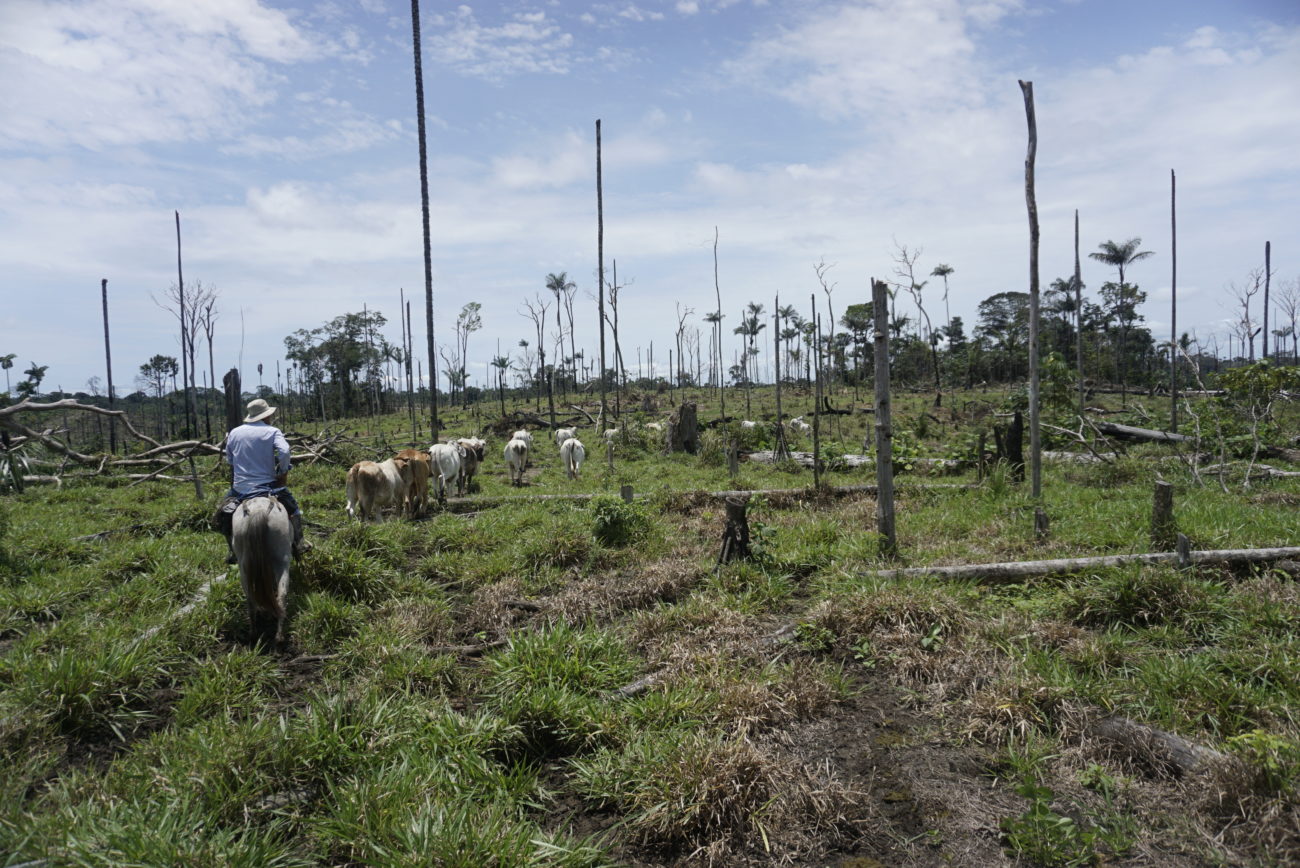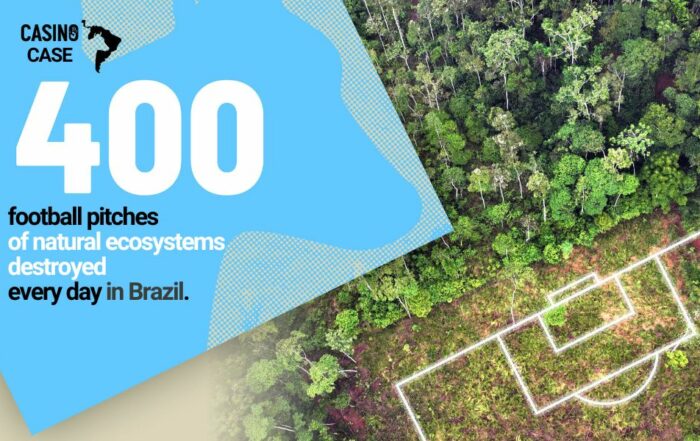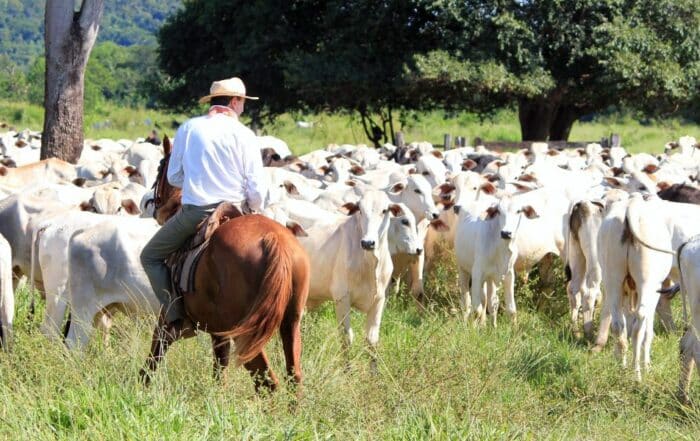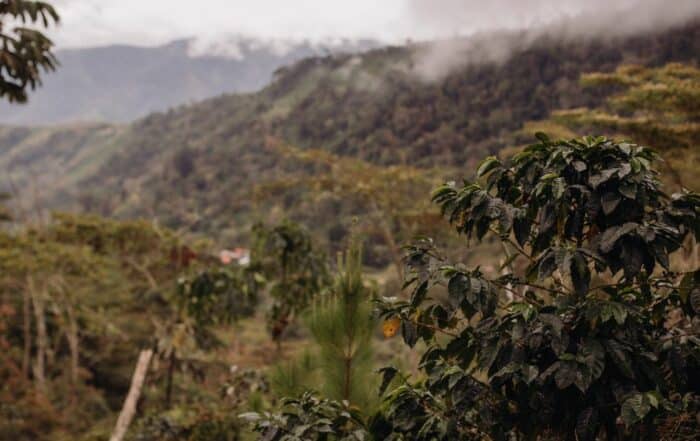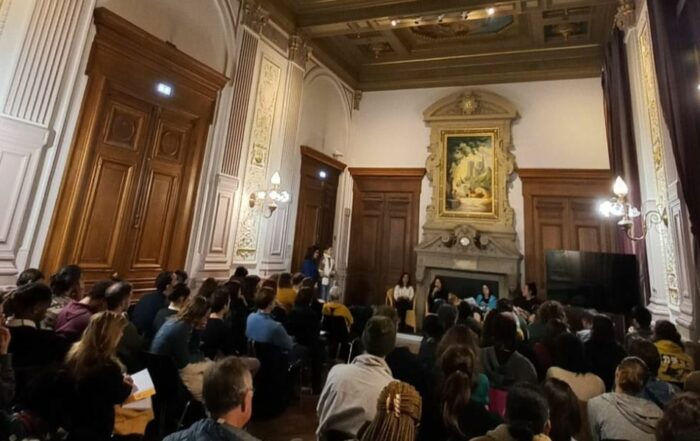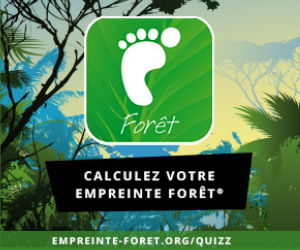In Colombia, Casino destroying national park and UNESCO site
In 2020, Envol Vert and its local partners in Brazil were pointing out the responsibility of Grupo Pão de Açúcar, a Casino Group’s subsidiary in Brazil, in the deforestation of the Amazon and the Cerrado. Further to these revelations, an alliance of eleven non-governmental organisations and representatives of indigenous peoples has sued Casino Group claiming the non-respect of the duty of care law for parent companies.
At present, the Environmental Investigation Agency (EIA) is showing evidence of deforestation and human rights abuses in another major market for Casino Group in South America, Colombia, within the supply chain of Grupo Éxito (Casino Group’s subsidiary). With this paper, Envol Vert presents the key findings of the investigation provided by EIA, the latest exclusive breaking news. As a NGO based in Colombia, Envol Vert is developing a critical analysis and seeking the commitment of Casino Group to enhance efforts to stop deforestation in Colombia.
In 2020, Envol Vert and its local partners in Brazil were pointing out the responsibility of Grupo Pão de Açúcar, a Casino Group’s subsidiary in Brazil, in the deforestation of the Amazon and the Cerrado. Further to these revelations, an alliance of eleven non-governmental organisations and representatives of indigenous peoples has sued Casino Group claiming the non-respect of the duty of care law for parent companies.
At present, the Environmental Investigation Agency (EIA) is showing evidence of deforestation and human rights abuses in another major market for Casino Group in South America, Colombia, within the supply chain of Grupo Éxito (Casino Group’s subsidiary). With this paper, Envol Vert presents the key findings of the investigation provided by EIA, the latest exclusive breaking news. As a NGO based in Colombia, Envol Vert is developing a critical analysis and seeking the commitment of Casino Group to enhance efforts to stop deforestation in Colombia.
Colombia a double-faced country : unique biodiversity and skyrocketing deforestation
Unique and irreplaceable ecosystems are under urgent threat of deforestation. WWF has identified more than 9 deforestation fronts in South America and among them, 2 are located in Colombia. In 2020, Colombia was ranked the sixth most deforested country in the world by Global Forest Watch. From 2000 to 2019, Colombia lost a total of nearly 2.8 millions hectares of forests, which is the equivalent surface of Belgium. According to IDEAM (Institute of Hydrology, Meteorology and Environmental Studies), cattle ranching is one of the main drivers of deforestation. In addition, this activity is a critical link with land grabbing whose process consists of illegal land acquisition, land-use change to turn into a lucrative asset, and then speculation in the land market.
Land grabbing process in Colombia
The northwest sector of the Amazonian basin in Colombia is essential for the preservation of rainforests and biodiversity. This area is an ecological corridor between the Andes and the Amazon rainforest and provides a critical habitat for unique and endangered species. Protection of these natural resources has led to two National Natural Parks : Chiribiquete and Macarena, Chiribiquete National Natural Park being the world’s largest tropical rainforest national park.
The EIA report Tainted Beef is based on research conducted at the heart of the arc of deforestation, in the northern and northwestern part of the Chiribiquete National Natural Park. It highlights a strong correlation between the increase in deforestation and the increase in cattle movement. However, it shall be stressed that the park regulations state very clearly the prohibition of land-use changes and, last but not least, the prohibition of cattle ranching.
The cattle sector is a key sector in Colombia, representing around 3.6% of national GDP and 7% of national jobs. The cattle herd reached a total of 28 millions heads in 2020. 97% of beef meat produced in the country is consumed at a national level. The beef sector can be divided into two parts: cattle ranching on one side, meat processing and distribution on the other side. Processed meat products are mainly distributed through the food retail channel. According to the Animal Slaughter Survey (ESAG – DANE 2019), supermarkets had a 23% market share for the first quarter 2019 (Viancha et al., 2020).
As the leader in the retail sector in Colombia (28% market share in 2020) Casino Group plays a major role in the beef sector.
Unique and irreplaceable ecosystems are under urgent threat of deforestation. WWF has identified more than 9 deforestation fronts in South America and among them, 2 are located in Colombia. In 2020, Colombia was ranked the sixth most deforested country in the world by Global Forest Watch. From 2000 to 2019, Colombia lost a total of nearly 2.8 millions hectares of forests, which is the equivalent surface of Belgium. According to IDEAM (Institute of Hydrology, Meteorology and Environmental Studies), cattle ranching is one of the main drivers of deforestation. In addition, this activity is a critical link with land grabbing whose process consists of illegal land acquisition, land-use change to turn into a lucrative asset, and then speculation in the land market.
Land grabbing process in Colombia
The northwest sector of the Amazonian basin in Colombia is essential for the preservation of rainforests and biodiversity. This area is an ecological corridor between the Andes and the Amazon rainforest and provides a critical habitat for unique and endangered species. Protection of these natural resources has led to two National Natural Parks : Chiribiquete and Macarena, Chiribiquete National Natural Park being the world’s largest tropical rainforest national park.
The EIA report Tainted Beef is based on research conducted at the heart of the arc of deforestation, in the northern and northwestern part of the Chiribiquete National Natural Park. It highlights a strong correlation between the increase in deforestation and the increase in cattle movement. However, it shall be stressed that the park regulations state very clearly the prohibition of land-use changes and, last but not least, the prohibition of cattle ranching.
The cattle sector is a key sector in Colombia, representing around 3.6% of national GDP and 7% of national jobs. The cattle herd reached a total of 28 millions heads in 2020. 97% of beef meat produced in the country is consumed at a national level. The beef sector can be divided into two parts: cattle ranching on one side, meat processing and distribution on the other side. Processed meat products are mainly distributed through the food retail channel. According to the Animal Slaughter Survey (ESAG – DANE 2019), supermarkets had a 23% market share for the first quarter 2019 (Viancha et al., 2020).
As the leader in the retail sector in Colombia (28% market share in 2020) Casino Group plays a major role in the beef sector.
Multiple illegalities within Group Casino’s supply chain
The report issued by the EIA (Environmental Investigation Agency) dated May, 27 exposes cases of deforestation over more than 400 hectares in the Chiribiquete and Macarena National Parks. These cases are directly linked to the Éxito group supply chain.To protect the diverse sources contacted during the investigation, EIA replaced their names by direct supplier A, indirect supplier 1 and 2, Company A, slaughterhouse A and trade fair 1 A. This methodology has also been retained in this article.
The report issued by the EIA (Environmental Investigation Agency) dated May, 27 exposes cases of deforestation over more than 400 hectares in the Chiribiquete and Macarena National Parks. These cases are directly linked to the Éxito group supply chain.To protect the diverse sources contacted during the investigation, EIA replaced their names by direct supplier A, indirect supplier 1 and 2, Company A, slaughterhouse A and trade fair 1 A. This methodology has also been retained in this article.
Case 1: 400 ha deforested in the Chiribiquete NNP – indirect supplier 1’s farm
For at least 12 years, direct supplier A provides Éxito group approximately 1 000 cows per month. To procure these animals, direct supplier A goes through farms that belong to him but also through intermediaries (indirect suppliers) among which indirect supplier 1. The latter has provided him with between 100 and 300 animals per month for at least 10 years . These animals are first bred in a legal farm, but the fattening step is subcontracted to indirect supplier 2 with whom he has worked since at least 5 years.
Indirect supplier 2 owns a farm located right in the Northern area of the Chiribiquete National Park. He stated to the EIA investigators that he deforested 400 has of protected forest in 2019 to pasture his cattle. He didn’t hide either his intent to do the same on another 400 ha in the coming months. In September 2020, he owned around 600 cattle heads: a large scale farm.
These cows from illegal farms enter Éxito group’s supply chain through “cattle laundering”: the livestock is registered as coming from indirect supplier 1 and then delivered to direct supplier A, subcontractor of Éxito group.
To see the evolution of deforestation between 2017 and March 2021 in the area of Chiribiquete NNP where the supplier 2 is present, drag the cursor on the image below:
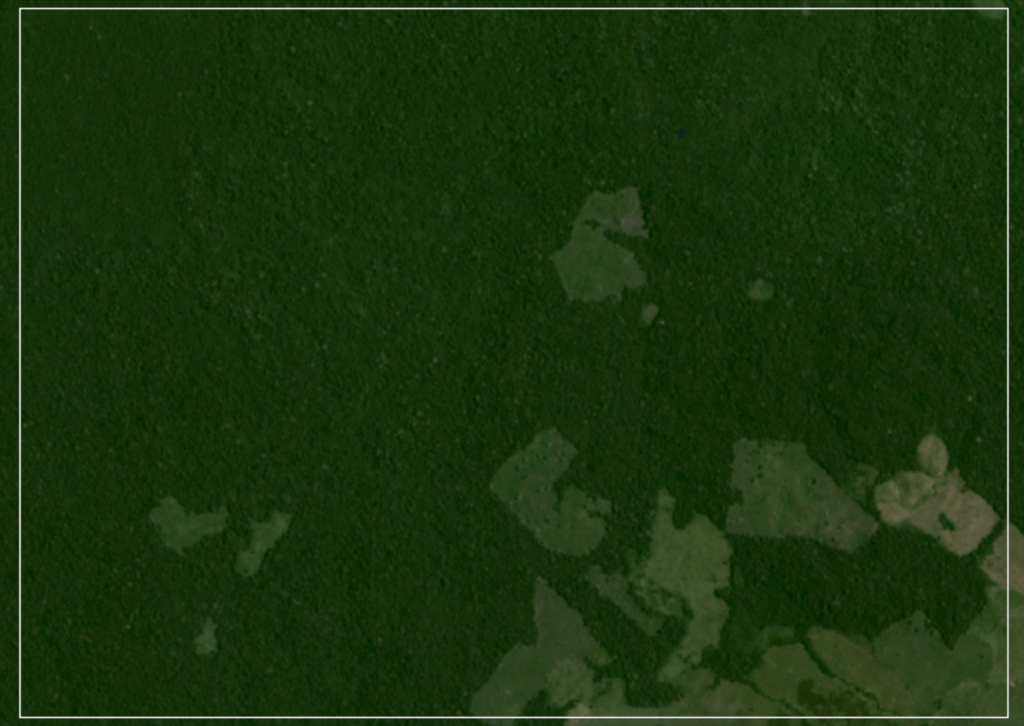
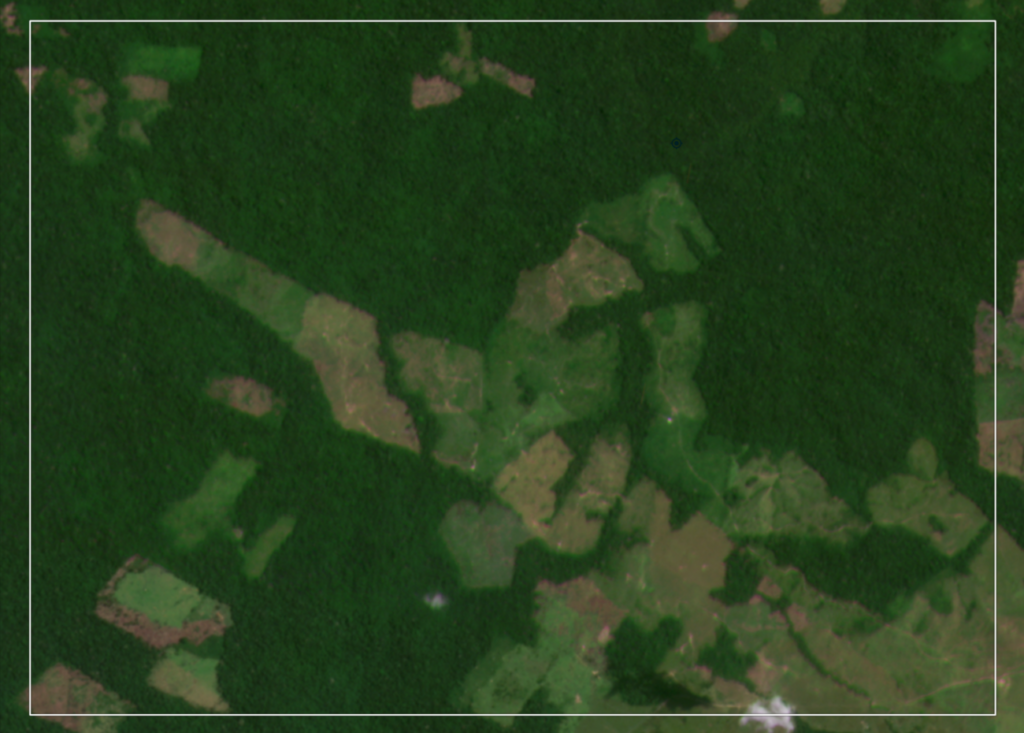
Photos taken on the plot of Indirect Supplier 2 in Chiribiquete National Park:
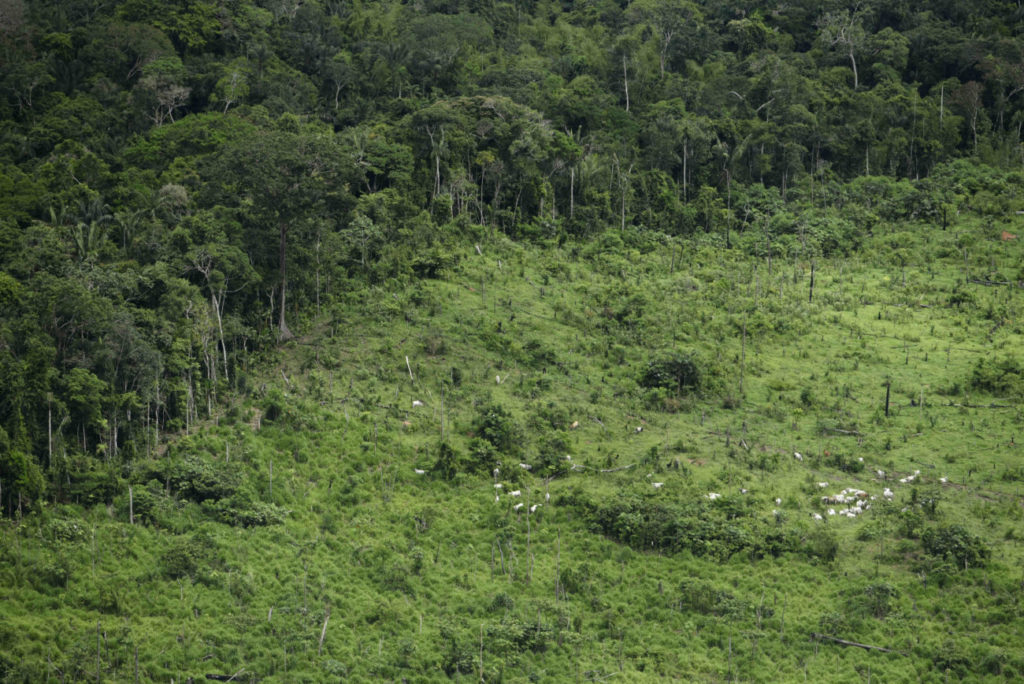
Case 2: An illegal farm in the Macarena NNP – Company A’s farm
The EIA investigation also helped identify a cattle trade link for the last 4 years between direct supplier A and Company A. Company A’s workers told the investigators that their biggest farm spreads over 2 000 hectares, among which 1 800 hectares of pasture. Part of this pasture is illegally located within the Macarena NNP.arena.
Case 3: Illegal actions in cattle trade fairs and auctions
Cattle fairs and auctions are strategic livestock trade places which help transactions between the various stakeholders of the beef supply chain. The coordinator of the breeding fair 1 told the investigators he sold cattle directly to Éxito group.
The analysis by the EIA of statistical data regarding cattle flows showed that between 2016 and 2019 over 1 500 cattle that came in this fair originated from 3 localities within the Macarena NNP and the forest preservation area around the Chiribiquete NNP.
The coordinator also told the investigators it was possible to sell cattle bred on illegally deforested lands by forging or hiding their origin.
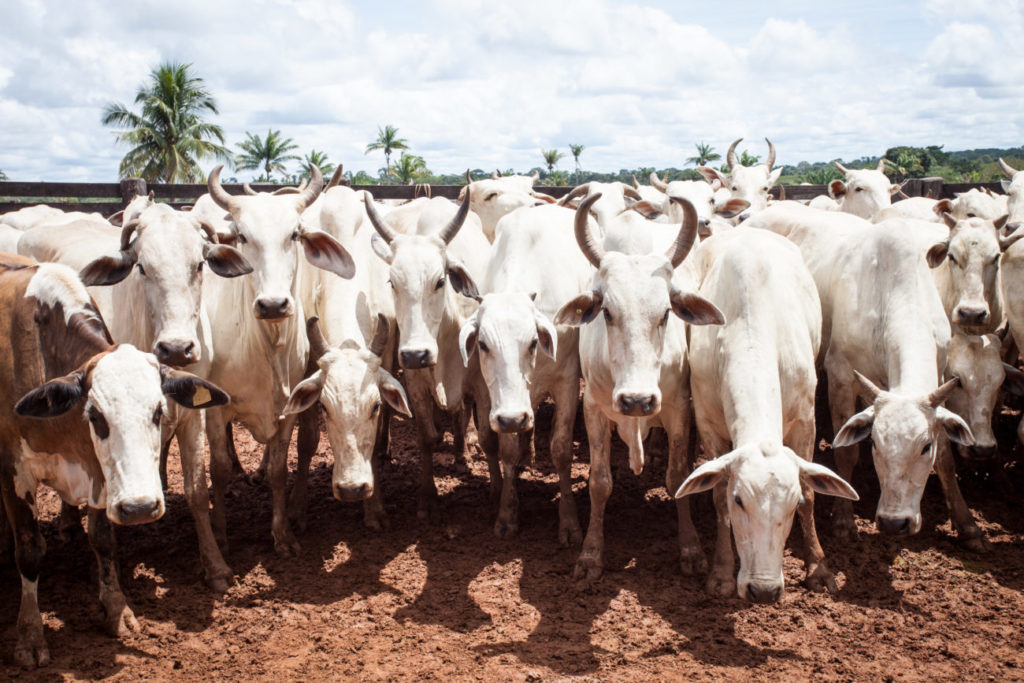
All these cases bring us back to armed groups
Indirect supplier 2 confided in the investigators that his farm is located in the Chiribiquete NNP and stated that the area is under the control of armed groups to whom he pays a revolution tax of 10 000 COP per animal (2.5€) rounding up to approximately 1 500€ per year for 600 cattle heads. As for the Macarena NNP, it was also confirmed that a revolution tax was paid to armed groups.
In exchange for this tax, suppliers are protected by armed groups and are not accountable to anyone.
Trade fair 1 manager admits he has the necessary contacts to sell cattle originating from areas under armed groups’ control.
All these cases bring us back to armed groups
Indirect supplier 2 confided in the investigators that his farm is located in the Chiribiquete NNP and stated that the area is under the control of armed groups to whom he pays a revolution tax of 10 000 COP per animal (2.5€) rounding up to approximately 1 500€ per year for 600 cattle heads. As for the Macarena NNP, it was also confirmed that a revolution tax was paid to armed groups.
In exchange for this tax, suppliers are protected by armed groups and are not accountable to anyone.
Trade fair 1 manager admits he has the necessary contacts to sell cattle originating from areas under armed groups’ control.
Does Éxito fight against these illegalities?
Strategic announcements that are not respected
The investigation undoubtedly shows that several announcements in Éxito’s policy are not respected, in particular:
Blanks in group Casino’s policy
Still Casino’s double dealing with a lot of Greenwashing but few concrete actions
Strategic announcements that are not respected
The investigation undoubtedly shows that several announcements in Éxito’s policy are not respected, in particular:
Blanks in group Casino’s policy
Still Casino’s double dealing with a lot of Greenwashing but few concrete actions
Assessment of the total area deforested in 2020 due to group Éxito’s activities in Columbia
As a reminder, group Éxito buys between 6.5% and 10% of all the meat sold in Columbia.
The share of meat produced in Columbia for local consumption is 97%. It is therefore possible to know the total volume of Columbian meat bought by group Éxito.
Deforestation in Columbia has reached a total of 160 000 ha of tropical forests in 2020 according to Global Forest Watch. Moreover, cattle breeding, the largest source of deforestation, is responsible for
70% of this deforestation.
We can therefore assume that group Éxito is responsible for approximately 7 200 ha of déforestation in 2020 because of its purchase of beef products, which is more than 10 000 of internal football fields.
This figure alone should compel the group to implement a strong policy as soon as possible. This is an estimation based on general statistics and assumptions for deforestation allocation. It does not take into account more precise data regarding the origin of cattle procured by group Éxito.
Requests from Envol Vert to Casino for its Colombian subsidiary
In Colombia, Casino destroying national park and UNESCO site
In 2020, Envol Vert and its local partners in Brazil were pointing out the responsibility of Grupo Pão de Açúcar, a Casino Group’s subsidiary in Brazil, in the deforestation of the Amazon and the Cerrado. Further to these revelations, an alliance of eleven non-governmental organisations and representatives of indigenous peoples has sued Casino Group claiming the non-respect of the duty of care law for parent companies.
At present, the Environmental Investigation Agency (EIA) is showing evidence of deforestation and human rights abuses in another major market for Casino Group in South America, Colombia, within the supply chain of Grupo Éxito (Casino Group’s subsidiary). With this paper, Envol Vert presents the key findings of the investigation provided by EIA, the latest exclusive breaking news. As a NGO based in Colombia, Envol Vert is developing a critical analysis and seeking the commitment of Casino Group to enhance efforts to stop deforestation in Colombia.
In 2020, Envol Vert and its local partners in Brazil were pointing out the responsibility of Grupo Pão de Açúcar, a Casino Group’s subsidiary in Brazil, in the deforestation of the Amazon and the Cerrado. Further to these revelations, an alliance of eleven non-governmental organisations and representatives of indigenous peoples has sued Casino Group claiming the non-respect of the duty of care law for parent companies.
At present, the Environmental Investigation Agency (EIA) is showing evidence of deforestation and human rights abuses in another major market for Casino Group in South America, Colombia, within the supply chain of Grupo Éxito (Casino Group’s subsidiary). With this paper, Envol Vert presents the key findings of the investigation provided by EIA, the latest exclusive breaking news. As a NGO based in Colombia, Envol Vert is developing a critical analysis and seeking the commitment of Casino Group to enhance efforts to stop deforestation in Colombia.
Colombia a double-faced country : unique biodiversity and skyrocketing deforestation
Unique and irreplaceable ecosystems are under urgent threat of deforestation. WWF has identified more than 9 deforestation fronts in South America and among them, 2 are located in Colombia. In 2020, Colombia was ranked the sixth most deforested country in the world by Global Forest Watch. From 2000 to 2019, Colombia lost a total of nearly 2.8 millions hectares of forests, which is the equivalent surface of Belgium. According to IDEAM (Institute of Hydrology, Meteorology and Environmental Studies), cattle ranching is one of the main drivers of deforestation. In addition, this activity is a critical link with land grabbing whose process consists of illegal land acquisition, land-use change to turn into a lucrative asset, and then speculation in the land market.
Land grabbing process in Colombia
The northwest sector of the Amazonian basin in Colombia is essential for the preservation of rainforests and biodiversity. This area is an ecological corridor between the Andes and the Amazon rainforest and provides a critical habitat for unique and endangered species. Protection of these natural resources has led to two National Natural Parks : Chiribiquete and Macarena, Chiribiquete National Natural Park being the world’s largest tropical rainforest national park.
The EIA report Tainted Beef is based on research conducted at the heart of the arc of deforestation, in the northern and northwestern part of the Chiribiquete National Natural Park. It highlights a strong correlation between the increase in deforestation and the increase in cattle movement. However, it shall be stressed that the park regulations state very clearly the prohibition of land-use changes and, last but not least, the prohibition of cattle ranching.
The cattle sector is a key sector in Colombia, representing around 3.6% of national GDP and 7% of national jobs. The cattle herd reached a total of 28 millions heads in 2020. 97% of beef meat produced in the country is consumed at a national level. The beef sector can be divided into two parts: cattle ranching on one side, meat processing and distribution on the other side. Processed meat products are mainly distributed through the food retail channel. According to the Animal Slaughter Survey (ESAG – DANE 2019), supermarkets had a 23% market share for the first quarter 2019 (Viancha et al., 2020).
As the leader in the retail sector in Colombia (28% market share in 2020) Casino Group plays a major role in the beef sector.
Unique and irreplaceable ecosystems are under urgent threat of deforestation. WWF has identified more than 9 deforestation fronts in South America and among them, 2 are located in Colombia. In 2020, Colombia was ranked the sixth most deforested country in the world by Global Forest Watch. From 2000 to 2019, Colombia lost a total of nearly 2.8 millions hectares of forests, which is the equivalent surface of Belgium. According to IDEAM (Institute of Hydrology, Meteorology and Environmental Studies), cattle ranching is one of the main drivers of deforestation. In addition, this activity is a critical link with land grabbing whose process consists of illegal land acquisition, land-use change to turn into a lucrative asset, and then speculation in the land market.
Land grabbing process in Colombia
The northwest sector of the Amazonian basin in Colombia is essential for the preservation of rainforests and biodiversity. This area is an ecological corridor between the Andes and the Amazon rainforest and provides a critical habitat for unique and endangered species. Protection of these natural resources has led to two National Natural Parks : Chiribiquete and Macarena, Chiribiquete National Natural Park being the world’s largest tropical rainforest national park.
The EIA report Tainted Beef is based on research conducted at the heart of the arc of deforestation, in the northern and northwestern part of the Chiribiquete National Natural Park. It highlights a strong correlation between the increase in deforestation and the increase in cattle movement. However, it shall be stressed that the park regulations state very clearly the prohibition of land-use changes and, last but not least, the prohibition of cattle ranching.
The cattle sector is a key sector in Colombia, representing around 3.6% of national GDP and 7% of national jobs. The cattle herd reached a total of 28 millions heads in 2020. 97% of beef meat produced in the country is consumed at a national level. The beef sector can be divided into two parts: cattle ranching on one side, meat processing and distribution on the other side. Processed meat products are mainly distributed through the food retail channel. According to the Animal Slaughter Survey (ESAG – DANE 2019), supermarkets had a 23% market share for the first quarter 2019 (Viancha et al., 2020).
As the leader in the retail sector in Colombia (28% market share in 2020) Casino Group plays a major role in the beef sector.
Multiple illegalities within Group Casino’s supply chain
The report issued by the EIA (Environmental Investigation Agency) dated May, 27 exposes cases of deforestation over more than 400 hectares in the Chiribiquete and Macarena National Parks. These cases are directly linked to the Éxito group supply chain.To protect the diverse sources contacted during the investigation, EIA replaced their names by direct supplier A, indirect supplier 1 and 2, Company A, slaughterhouse A and trade fair 1 A. This methodology has also been retained in this article.
The report issued by the EIA (Environmental Investigation Agency) dated May, 27 exposes cases of deforestation over more than 400 hectares in the Chiribiquete and Macarena National Parks. These cases are directly linked to the Éxito group supply chain.To protect the diverse sources contacted during the investigation, EIA replaced their names by direct supplier A, indirect supplier 1 and 2, Company A, slaughterhouse A and trade fair 1 A. This methodology has also been retained in this article.
Case 1: 400 ha deforested in the Chiribiquete NNP – indirect supplier 1’s farm
For at least 12 years, direct supplier A provides Éxito group approximately 1 000 cows per month. To procure these animals, direct supplier A goes through farms that belong to him but also through intermediaries (indirect suppliers) among which indirect supplier 1. The latter has provided him with between 100 and 300 animals per month for at least 10 years . These animals are first bred in a legal farm, but the fattening step is subcontracted to indirect supplier 2 with whom he has worked since at least 5 years.
Indirect supplier 2 owns a farm located right in the Northern area of the Chiribiquete National Park. He stated to the EIA investigators that he deforested 400 has of protected forest in 2019 to pasture his cattle. He didn’t hide either his intent to do the same on another 400 ha in the coming months. In September 2020, he owned around 600 cattle heads: a large scale farm.
These cows from illegal farms enter Éxito group’s supply chain through “cattle laundering”: the livestock is registered as coming from indirect supplier 1 and then delivered to direct supplier A, subcontractor of Éxito group.
To see the evolution of deforestation between 2017 and March 2021 in the area of Chiribiquete NNP where the supplier 2 is present, drag the cursor on the image below:


Photos taken on the plot of Indirect Supplier 2 in Chiribiquete National Park:

Case 2: An illegal farm in the Macarena NNP – Company A’s farm
The EIA investigation also helped identify a cattle trade link for the last 4 years between direct supplier A and Company A. Company A’s workers told the investigators that their biggest farm spreads over 2 000 hectares, among which 1 800 hectares of pasture. Part of this pasture is illegally located within the Macarena NNP.arena.
Case 3: Illegal actions in cattle trade fairs and auctions
Cattle fairs and auctions are strategic livestock trade places which help transactions between the various stakeholders of the beef supply chain. The coordinator of the breeding fair 1 told the investigators he sold cattle directly to Éxito group.
The analysis by the EIA of statistical data regarding cattle flows showed that between 2016 and 2019 over 1 500 cattle that came in this fair originated from 3 localities within the Macarena NNP and the forest preservation area around the Chiribiquete NNP.
The coordinator also told the investigators it was possible to sell cattle bred on illegally deforested lands by forging or hiding their origin.

All these cases bring us back to armed groups
Indirect supplier 2 confided in the investigators that his farm is located in the Chiribiquete NNP and stated that the area is under the control of armed groups to whom he pays a revolution tax of 10 000 COP per animal (2.5€) rounding up to approximately 1 500€ per year for 600 cattle heads. As for the Macarena NNP, it was also confirmed that a revolution tax was paid to armed groups.
In exchange for this tax, suppliers are protected by armed groups and are not accountable to anyone.
Trade fair 1 manager admits he has the necessary contacts to sell cattle originating from areas under armed groups’ control.
All these cases bring us back to armed groups
Indirect supplier 2 confided in the investigators that his farm is located in the Chiribiquete NNP and stated that the area is under the control of armed groups to whom he pays a revolution tax of 10 000 COP per animal (2.5€) rounding up to approximately 1 500€ per year for 600 cattle heads. As for the Macarena NNP, it was also confirmed that a revolution tax was paid to armed groups.
In exchange for this tax, suppliers are protected by armed groups and are not accountable to anyone.
Trade fair 1 manager admits he has the necessary contacts to sell cattle originating from areas under armed groups’ control.
Does Éxito fight against these illegalities?
Strategic announcements that are not respected
The investigation undoubtedly shows that several announcements in Éxito’s policy are not respected, in particular:
Blanks in group Casino’s policy
Still Casino’s double dealing with a lot of Greenwashing but few concrete actions
Strategic announcements that are not respected
The investigation undoubtedly shows that several announcements in Éxito’s policy are not respected, in particular:
Blanks in group Casino’s policy
Still Casino’s double dealing with a lot of Greenwashing but few concrete actions
Assessment of the total area deforested in 2020 due to group Éxito’s activities in Columbia
As a reminder, group Éxito buys between 6.5% and 10% of all the meat sold in Columbia.
The share of meat produced in Columbia for local consumption is 97%. It is therefore possible to know the total volume of Columbian meat bought by group Éxito.
Deforestation in Columbia has reached a total of 160 000 ha of tropical forests in 2020 according to Global Forest Watch. Moreover, cattle breeding, the largest source of deforestation, is responsible for
70% of this deforestation.
We can therefore assume that group Éxito is responsible for approximately 7 200 ha of déforestation in 2020 because of its purchase of beef products, which is more than 10 000 of internal football fields.
This figure alone should compel the group to implement a strong policy as soon as possible. This is an estimation based on general statistics and assumptions for deforestation allocation. It does not take into account more precise data regarding the origin of cattle procured by group Éxito.

